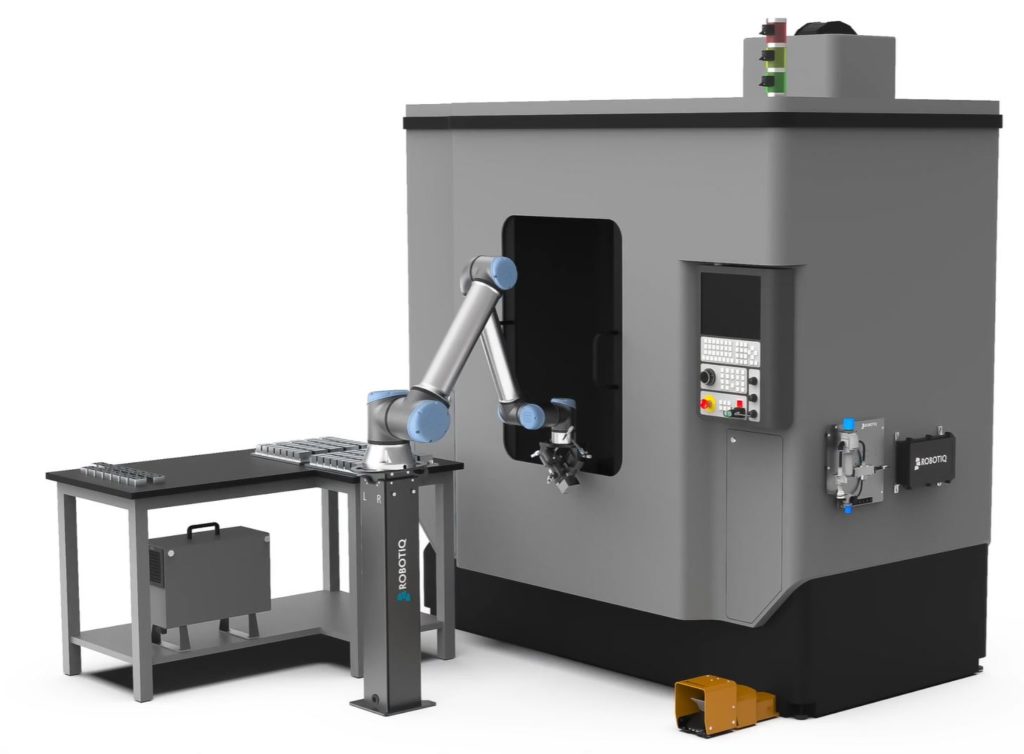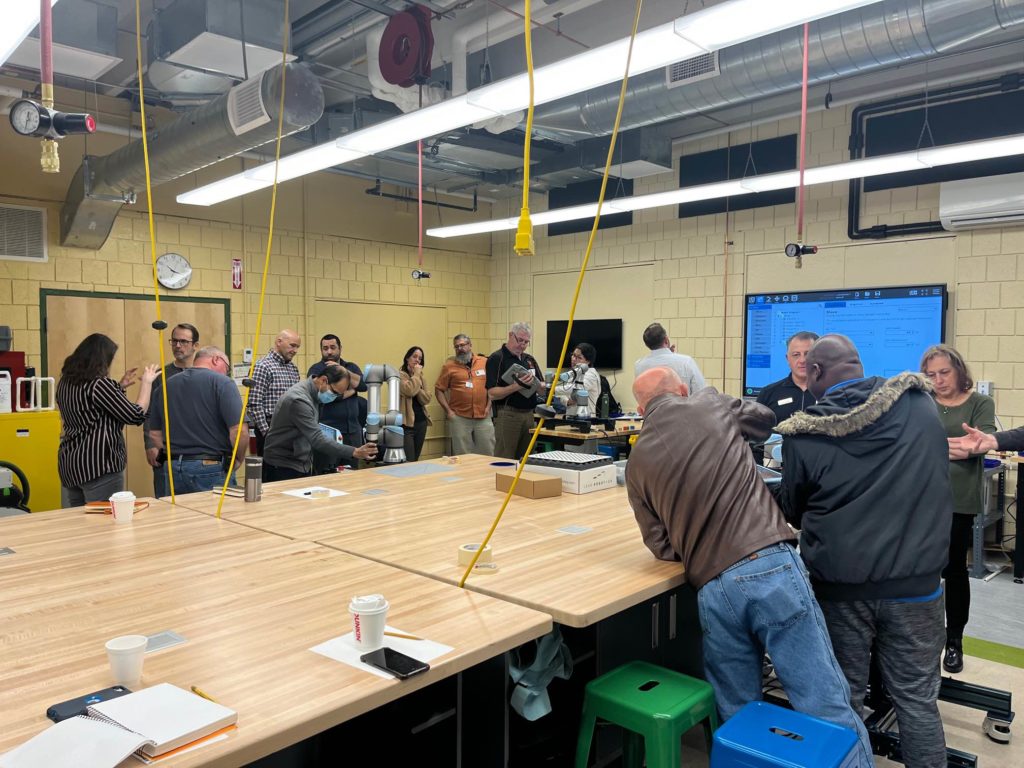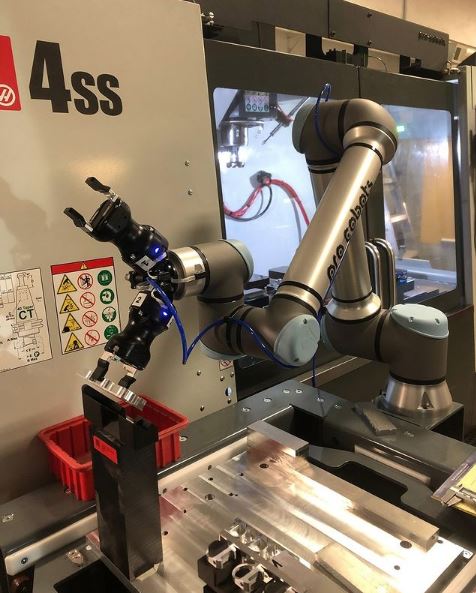In today's rapidly evolving manufacturing landscape, robotics has become integral to ensuring productivity and addressing labor shortages. As the demand in manufacturing progresses, robots and automation will continue to be part of the manufacturing process.
This guide will help you as an educator learn about robotics in the Massachusetts manufacturing industry. We'll also highlight how to teach your students skills related to robotics in manufacturing to prepare them for the manufacturing jobs of today and the future.
The Importance of Robotics in Manufacturing
Robots have revolutionized the manufacturing industry by providing companies with flexibility, productivity, and quality outputs. Industrial robots are essential for manufacturing heavy parts, whereas collaborative robots are known for their flexibility in quickly reprogramming and redeploying to different applications.
Robots increase productivity because they can work reliably around the clock, producing consistently higher quality products and reducing scrap. They also take on repetitive tasks that are undesireable for human workers, giving skilled machinists opportunities to work in more rewarding positions.
Facts about Robotics in Manufacturing
The adoption of robotics in manufacturing has been steadily increasing over the years. Let's take a look at some facts that highlight the significance of robotics in the manufacturing industry:
- Industries are investing in automation within their processes over the next 5 years, especially in retail, consumer goods, life sciences, healthcare, and pharma. McKinsey 2023
- Massachusetts is home to more than 180 robotics companies. MassTech Collaborative 2024
- There are more than 70 robotics R&D labs within Massachusetts' universities and non-profit facilities. MassTech Collaborative 2024
- Robotics venture capital funding in Massachusetts has been in AI/machine learning, supply chain, mobility, and manufacturing applications. MassTech Collaborative 2024
Robotics Jobs with Massachusetts Manufacturers
The presence of robots in manufacturing is creating and evolving jobs, as highlighted in a MassTech study about robotics in the Massachusetts advanced manufacturing industry. The position expected to have the highest demand by 2030 is electro-mechanical or mechatronics engineering technicians (also known as robotics technicians) due to the field requiring knowledge of both electrical and mechanical engineering principles. CNC operators and maintenance technicians are also expected to grow.
Employers state that it is challenging to hire for these roles because it's rare to find people with the right experience. On-the-job training takes months to get new hires without the proper background up to speed. Most employers agree that industry-recognized certifications help potential employees gain relevant job qualifications and signal interest in the job.
Massachusetts Standards for Teaching Robotics in Advanced Manufacturing Programs
The latest Massachusetts CTE frameworks for advanced manufacturing Chapter 74 programs includes teaching standards and skills for robotics in manufacturing, recognizing the local industry needs. The standards outline that students should identify the uses of robotics in the manufacturing process and examine how automated systems engineering is used to reduce human effort and time and increase accuracy in production. Skills students should obtain in advanced manufacturing programs include:
- Defining robot terms, components, and automated systems
- Describing open-loop and close-loop control systems
- Describing the working relationship between CNC equipment and robots
Hands-on Activities and Equipment for Teaching Robotics in an Advanced Manufacturing Program
Robots offer many ways to engage students and provide practical experiences. Collaborative robots are perfect for classrooms because they allow students to quickly learn robotics. They don't require coding experience for programming and are safe to use.
Here are some ideas for hands-on activities and projects that can be incorporated into your teaching:
Industry-Recognized Certifications
Students learn the fundamentals of robotics through hands-on exercises with a Universal Robots collaborative robot and online courses, earning an industry-recognized NC3 certification.
Programming Exercises
No coding experience is needed to program a Universal Robots collaborative robot. Students use visual programming to program the robot with a PLC. Students can easily program the robot to pick an item up with a gripper and drop the item in a new place.

Integration with Manufacturing Processes
Universal Robots collaborative robots integrate with various CNC machines, including HAAS and Tormach mini-mills and lathes. Students can create automated systems integrating CNC and robotics technologies.
Using End Defectors
Many types of end defectors can be added to Universal Robots cobots. Students can program the robot to pick up various objects using grippers.
Robots complement a classroom with a variety of advanced manufacturing equipment to provide exposure to real-world scenarios.
Educator Training and Professional Development
Advanced manufacturing instructors can quickly learn how to teach robotics to stay at the forefront of the industry and provide students with the most relevant skills. Here are some avenues for training and professional development:
NC3 Train-the-Trainer Programs
NC3 (National Coalition of Certification Centers) offers educators virtual and in-person training programs to certify students in robotics.

In-Person Professional Development
AET Labs helps New England educators incorporate equipment into their advanced manufacturing programs. Our Application Specialist leads 1-on-1 and group professional development sessions.
The Future of Robotics in Manufacturing and the Role of Educators
As robotics and automation continue to transform the manufacturing industry, the role of educators becomes increasingly vital. With the right guidance and education, students can contribute significantly to the demands of Massachusetts manufacturing companies.
To find out how to incorporate robotics into your advanced manufacturing CTE program, reach out to AET Labs. We partner with high schools, technical colleges, and universities in New England to provide equipment, local service, and in-person professional development.


